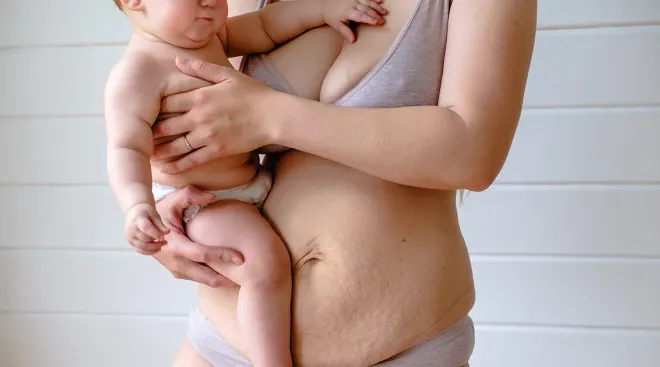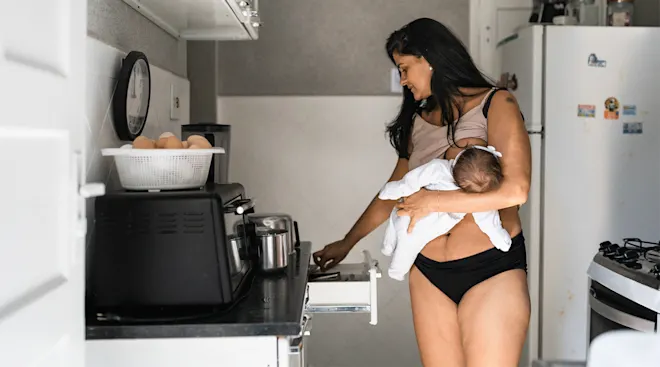Parental Burnout Is Real—Here’s How to Cope
Ever start counting down the hours to bedtime within 10 minutes of your child waking up? Get teary-eyed when you’re asked to play hide and seek for the umpteenth time—only to realize it may be your one opportunity to be alone all day? Do you occasionally spend way more time sitting on the toilet than actually necessary, and treat it as a temporary escape?
The truth is, as much as we love our kids, being a parent isn’t always fun—in fact, it can be downright draining. But if you’re finding yourself in a depleted mental space more often than not, you might be dealing with parental burnout. The reasons for this are complex, but also entirely obvious. The good news? There are steps you can take to refuel and recharge your body and mind. Here’s what you need to know, plus tips to help you cope.
Burnout has gotten a lot of attention in the past few years (thanks, pandemic!). But the idea of being worn out to the point where you’re totally exhausted, entirely unmotivated and completely unable to cope with life’s everyday demands isn’t actually anything new. Psychologists started talking about burnout back in the 1970s—at least, in the context of people with high-pressure jobs.
Of course, now we know that burnout doesn’t just happen at work. The nonstop responsibilities of being a caregiver can cause moms and dads to feel burnt out in their roles as parents too. “It’s normal to go through cycles of stress and feeling overwhelmed. But with burnout, you’re stressed to the [next] degree. It’s to the point where you’re unable to perform your duties, because you just don’t care anymore,” says Whitney Casares, MD, a pediatrician and author of The Working Mom Blueprint.
It’s true that the insanity of the last few years has put a spotlight on parental burnout. “The pandemic, lockdown and the way that social media has evolved have simultaneously drawn attention to the issue and exacerbated it for many families," says Valerie Hernandez, LMSW, a social worker in Upper Marlboro, Maryland. And when you’ve got all those pressures and stressors swirling around in your brain, you’re probably going to have less bandwidth to argue with your 3-year-old about whether or not they’re allowed to watch another episode of Paw Patrol. It can feel like you’re throwing in the towel—and not necessarily in a good way.
Having too much on your plate and lacking the resources or support to deal with it all is a recipe for burnout. “In many family dynamics, there’s a ‘primary parent’ that may or may not hold down a paying job outside of parenting, but who is responsible for the physical responsibilities involved with parenting in addition to the emotional and mental responsibilities. These parents are much more likely to experience burnout,” Hernandez says. Keeping tabs on how much food is in the fridge, scheduling doctor appointments, staying in touch with the school or daycare, RSVPing to birthday parties and buying gifts, being the go-to person when your kid is sad, bored or sick—these things (and more) add up and contribute to exhaustion and burnout. And while all primary caregivers can feel burn out, it’s worth noting that moms are, at least anecdotally, more affected.
Parents juggling jobs outside and inside the home may also be more likely to feel the burn: A 2022 report found that 66 percent of working parents feel burnt out.
Additionally, the risk for parental burnout increases with other stressors. This includes things like having a child with special needs, caring for an aging parent or living in a situation where your family’s physical or mental-health needs aren’t being met because of trauma, food insecurity or homelessness. “Stagnant wages, inadequate parental leave, the costs of childcare, social injustice crises and a lack of access to quality education and healthcare significantly impact the mental health and wellness of parents,” says California-based child-parent relationship expert Bryana Kappadakunnel, LMFT, PMH-C. That said, we all have unique circumstances that contribute to our own respective mental states; there’s no one path to parental burnout.
To determine whether you’re dealing with parental burnout, take a step back and assess how you’ve been interacting with your kids. “In my practice, I know a parent is burnt out if they’re more emotionally reactive to problems that would be considered developmentally appropriate,” says Kappadakunnel. This might look like yelling at your toddler for flinging a strawberry across the kitchen at breakfast, instead of getting mildly annoyed—or crying when your preschooler refuses to put on their shoes, instead of taking a deep breath.
Of course, we all get fed up with our kids from time to time. Losing it one night at bedtime when you’re tired and your little one is refusing to go to sleep doesn’t necessarily mean you’re burnt out—it means you’re human. “It’s the persistence of burnout that separates it from the normal lows of parenting,” Casares says. “If you constantly feel like you can’t wait until the end of the day, it means something might need to change.”
Parental burnout can manifest in a few different ways. According to the American Psychological Association, some common parental burnout symptoms include:
- Frequent irritation
- Utter exhaustion
- Sleep deprivation
- Changes in sleep patterns
- Detachment
- Distress, shame and guilt
- Feeling trapped
It’s also important to realize that the signs of parental burnout don’t just appear out of thin air. They can build on each other, eventually weighing you down with a hefty mental load. Recognize your own parental burnout stages. If you’re starting to feel that telltale resentment, or if you notice you’re snapping at the kids more frequently, it might be time to address your mental state before it progresses into a full-fledged burnout situation.
Easing a case of parental burnout calls for more than just making time for a hot bath after your kids are in bed (although self-care can certainly help and is always welcome!). You need tools to trim your workload and ways to bolster your support system. Below, some strategies to try:
Be nice to yourself
Feeling burnt out doesn’t mean you’re a bad parent. It just means you’ve got a load that’s too big to handle without the additional help required. “Burnout is not a sign of moral failing. Every person has the potential to experience it,” Hernandez says. Instead of beating yourself up, think of what you’d say to a friend who is having a hard time. You wouldn’t tell them they were the worst for serving cereal for dinner or snapping at their kid. You’d give them a hug and tell them to take a break. Extend yourself the same grace and courtesy.
Ask for help
There are plenty of tasks and activities in your family’s day that someone needs to do. But that someone doesn’t necessarily have to always be you. “I call them swappables. They’re the things you could be doing with someone else,” Cesares says. Switch off packing lunches for daycare with your partner so you’re not stuck doing it every night. Ask another mom you trust to take your toddler to the playground one afternoon a week, and offer to do the same for her another afternoon. These are quick breaks, but even a little breathing room can have a big impact.
Drop the contaminators
“These are the things we don’t want to do, but that we do anyway because we think it means being a good parent,” Cesares says. It might mean forgoing that Saturday morning toddler tumbling class so you don’t have to schlep out the door the second breakfast ends. Go ahead and cancel the subscription craft box that sounded nice when you ordered it, but actually just leaves a huge mess for you to clean up each month. If you’ll be less stressed without these “extras,” then feel free to curate your life. Your kid will be fine either way.
Prioritize your physical health
Your mental well-being is connected to your physical health. Eating balanced meals, getting exercise and prioritizing sleep (easier said than done, we know!) are simple but important ways to fill your proverbial cup and refuel your body for another rollercoaster day of parenting.
Set boundaries with your kids
It’s okay to want a break from playing or reading or cuddling together. But your kids probably won’t offer you one, so you’ll have to claim it for yourself. “Be honest with your kids in the simplest way possible that you need some time for you. It models self-care for them,” says Meghan Englert, LMFT, a therapist and parenting coach in Royersford, Pennsylvania.
If you know your toddler or preschooler will just follow you into your chill-out space, work with them on practicing your adult time-outs. After you’ve had enough of whatever activity the two of you are doing, tell them you’re going to take a short break in a dedicated space, like your bedroom. “Your kids will eventually stop following you; there’s no mystery of where you’re going,” Englert says.
Find a place to vent
Feel like you’re on the brink? A therapist or mental health professional can be the sounding board you need. But a support system of like-minded moms and dads can also help. Make the effort to chat with that parent on the playground who looks as worn out as you do. Ask your partner to do bedtime so you can finally make it to that neighborhood moms-only book club. Talking about your problems with people who are going through the same thing won’t necessarily solve them, but “finding or creating communities of parents can offer you real, tangible support,” Kappadakunnel says. Sometimes, simply feeling seen and heard can help.
About the experts:
Whitney Casares, MD, is a pediatrician and AAP spokesperson, and the author of The Working Mom Blueprint: Winning at Praenting Without Losing Yourself. She earned her medical degree from the University of Vermont.
Meghan Englert, LMFT, is a marriage and family therapist and parenting coach.
Valerie Hernandez, LMSW, is a social worker in Upper Marlboro, Maryland.
Bryana Kappadakunnel, LMFT, PMH-C, is a child-parent relationship expert based in Redondo Beach, California.
Please note: The Bump and the materials and information it contains are not intended to, and do not constitute, medical or other health advice or diagnosis and should not be used as such. You should always consult with a qualified physician or health professional about your specific circumstances.
Plus, more from The Bump:
Navigate forward to interact with the calendar and select a date. Press the question mark key to get the keyboard shortcuts for changing dates.




















































